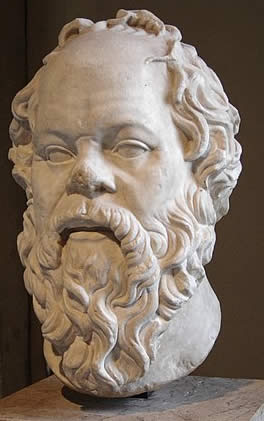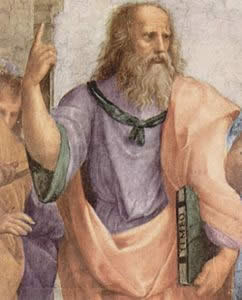I know that I know nothing
The Athenians needed a scapegoat. Politically, the city's fortunes were receding in 399 B.C. after a humiliating defeat, five years before, at the hands of its traditional enemy, Sparta. There was one man in Athens who had made himself a reputation for being awkward-the philosopher Socrates. He liked to ask difficult and irritating questions; he mocked those in power and spent his time debating ideas with a band of devoted pupils. Socrates was a classical Greek philosopher. Socrates was one of the most significant thinkers in the course of history and, with Plato and Aristotle, was largely responsible for founding Western philosophy.
 A marble head of Socrates in the Louvre. Born c. 470 BC at Athens. Died 399 BC (aged approx. 71)
A marble head of Socrates in the Louvre. Born c. 470 BC at Athens. Died 399 BC (aged approx. 71)
The gadfly
Claiming loyalty to his city, Socrates clashed with the current course of Athenian politics and society. Plato refers to Socrates as the "gadfly" (A gadfly is a person who interferes with the status quo of a society or community by posing novel, potentially upsetting questions, usually directed at authorities) of the state, in so far as he irritated some people with considerations of justice and the pursuit of goodness. His attempts to improve the Athenians' sense of justice may have been the source of his execution.
Whether anyone was wiser than Socrates?
According to Plato's “Apology”, Socrates' life as the "gadfly" of Athens began when his friend Chaerephon asked the oracle at Delphi: if anyone was wiser than Socrates. (An oracle is a person or agency considered to provide wise and insightful counsel or prophetic predictions or precognition of the future, inspired by the gods) The Oracle responded that none was wiser than Socrates. Socrates believed that what the Oracle had said was a paradox (absurdity), because he believed he possessed no wisdom whatsoever.
 Plato
Plato
He proceeded to test the riddle by approaching men considered wise by the people of Athens—statesmen, poets, and artisans—in order to refute the Oracle's pronouncement. Questioning them, however, Socrates concluded that, while each man thought he knew a great deal and was wise, in fact they knew very little and were not wise at all. Socrates realized that the Oracle was correct, in that while so-called wise men thought themselves wise and yet were not, he himself knew he was not wise at all, which, paradoxically, made him the wiser one since he was the only person aware of his own ignorance.
Socrates' paradoxical wisdom made the prominent Athenians he publicly questioned look foolish, turning them against him and leading to accusations of wrongdoing. "I know that I know nothing" is a saying derived from Plato's account of the Greek philosopher Socrates. It is also called the Socratic paradox.
Socrates was found guilty of both corrupting the minds of the youth of Athens and of "not believing in the gods of the state", and subsequently sentenced to death by drinking a mixture containing poison hemlock, a toxic herb that paralyzes the nervous system.